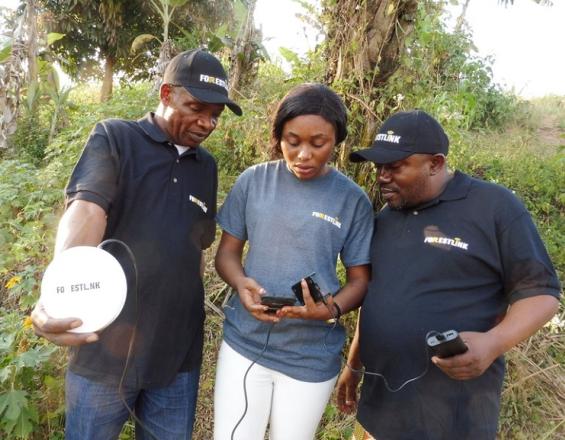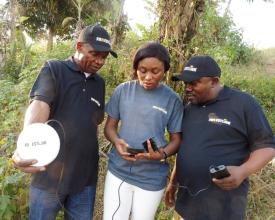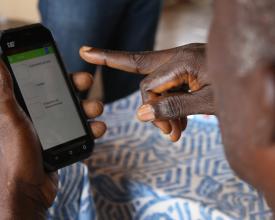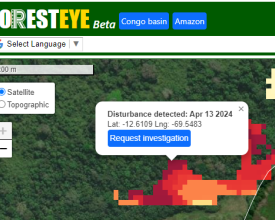
ForestLink

ForestLink: Real-Time Forest Monitoring & Inclusive Decision-Making for Biodiversity. Innovative & low-tech, our ForestLink tech empowers Indigenous people & local communities to monitor tropical forests where they live in real-time, reducing deforestation & protecting human rights & the environment. Using just a mobile phone, forest communities can report illegal activities via satellite, even from remote areas, putting power back in their hands. ForestLink leverages their unique knowledge to defend their rights & influence extractive industries. Being a highly adaptable tool, ForestLink is currently deployed in 5 countries, where it covers a range of issues, e.g. GBV, land rights violations, forest illegalities etc. Data collection can be adapted for smartphones, or simply via SMS, ensuring access to the most remote communities. ForestLink is developed & used in accordance with a rights-based approach & in line with the principles of consent & do-no-harm. Any use of data is in accordance with survivor-centred principles.
Tech4Nature Award
Rainforest Foundation UK (RFUK) has developed the ForestLink system over the past decade based on the explicit needs of environmental defenders and communities.
The ForestLink end-to-end system enables communities anywhere in the world to capture & transmit highly accurate reports of forest illegalities & land tenure or human rights violations to authorities & other stakeholders in real-time – even in areas with no mobile or internet connectivity. Using a customisable app, trained community observers send low-tech alerts using specially compressed data on a range of different issues to a central geospatial database via SMS, internet or a satellite connection. Local NGOs help community monitors collect data, which they &/or government agencies can then analyse to identify illegal hotspots or patterns. This can lead to targeted investigations, law enforcement actions, &, in the case of NGOs & civil society groups, broader advocacy efforts.
Monitoring and collection:
Local & Indigenous community monitors report results of forest monitoring to the enabling local organisations working on issues of conservation, land rights, human rights or environmental protection. These reports can be sent by basic SMS, or via a smartphone app that also works offline, or can be added to the system via the web interface. They can add evidence (e.g. photos) to their reports.
Administration & follow-up:
The collected evidence is stored in a secure central geospatial database where it is picked up by the designated local organisations working on issues of conservation, land rights, human rights or environmental protection. Data access rights are discussed in advance with local NGOs & community monitors to ensure consent & safety & security.
Enforcement:
Details of the reports can be made public on the map with the consent of the people (real-time publication is not required, to ensure user safety), analysed & passed on to appropriate authorities/organisations so that they can take action including: sanctioning companies, destroying illegal mining sites, providing support to victims or taking legal action.
Advocacy:
The data collected helps local NGOs carry out follow-up activities with local authorities in order to foster increased transparency, good governance & law enforcement.
New developments
ForestLink has been continuously improved by our in-house development team for well over a decade & we are now in a position to launch ForestLink II in 2025 which includes the ForestEye satellite data intelligence system. ForestLink along with ForestEye will combine the latest satellite data on deforestation plus local observations & knowledge to provide powerful data intelligence about environmental & human rights threats.
The new system will offer greater accessibility, better appropriation of data by local partners & communities, & greater adaptability, with the aim of strengthening law enforcement & transparency.
This innovative technology directly supports the implementation of several GBF targets by empowering forest communities with real-time, ground-verified forest monitoring tools. The system aligns with GBF Target 1 & Target 2 by enabling community-based planning & restoration efforts that help reduce biodiversity loss & rehabilitate degraded ecosystems. By allowing users to document and report illegal logging, poaching, & other infractions, it contributes to Target 5 and Target 9, ensuring wild species are harvested & managed sustainably and legally. ForestLink (together with ForestEye) also supports Target 10 and Target 11 by improving transparency & oversight in sectors like forestry, thereby enhancing the sustainability of nature-based livelihoods & preserving nature’s contributions to people. On a broader scale, the tool helps fulfill Target 15 by providing businesses & authorities with localised, actionable data to assess and mitigate biodiversity-related risks. Furthermore, our technology facilitates Target 20 & Target 21 by fostering technology transfer, building local capacity for biodiversity monitoring, & making critical data accessible for informed decision-making. Finally, by placing cutting-edge monitoring capabilities directly in the hands of Indigenous Peoples & local communities, the system exemplifies Target 22—ensuring inclusive participation, access to justice & biodiversity-related information, even in the most remote areas.
Added value
ForestLink adds value to existing systems available to collect and manage data from remote locations . It has in-built mapping tools helping remote communities to place themselves on the map and map their land-use. ForestLink provides the latest deforestation alerts from across the Congo and Amazon for free to anyone with a web browser without login making the deforestation situation in anyone's locality immediately clear.
Federal Ministry for Economic Cooperation and Development - https://www.bmz.de/en
UKAID - https://www.ukaiddirect.org/
AFD - https://www.afd.fr/en
Arcus Foundation - https://www.arcusfoundation.org/
Fondation Ensemble - https://www.fondationensemble.org/en/
11th Hour Project - https://11thhourproject.org/
Montpelier Foundation - https://montpelierfoundation.org.uk/
The Waterloo Foundation - https://www.waterloofoundation.org.uk/
Good Energies Foundation - https://www.porticus.com/en/our-regions/good-energies-foundation
Earth Insight - https://earth-insight.org/
IUCN - https://iucn.org/
Context
Challenges addressed
Environmental: Illegal logging, mining & agricultural expansion drive deforestation in the Amazon & Congo Basin, threatening biodiversity & climate stability. ForestLink helps Indigenous & local communities monitor & protect forests, reducing deforestation & preserving ecosystems.
Social: Indigenous communities & forest communities face marginalization, land rights violations & violence. ForestLink empowers them with tools & training to document illegalities & defend their rights. In Kenya, ForestLink allows women to report land rights abuses & gender-based violence, promoting justice & equity.
Economic: Corruption & power imbalances in the forest sector & the extractive economy can deprive members of marginalised communities of their rights to manage their resources & gain economic benefits. ForestLink fosters legal compliance, helping communities, including women & Indigenous people, secure their rightful resources & promote sustainable development.
Location
Process
Summary of the process
ForestLink enables Indigenous & local communities to report forest illegalities & land rights violations, fostering forest protection & advocacy. By collaborating with grassroots organisations, Indigenous people & women, our approach builds trust, ensures cultural understanding & adapts tools to local contexts & needs, prioritising inclusivity.
ForestLink allows remote communities to collect & share real-time data, driving legal actions & policy changes. Strong NGO advocacy networks are essential to amplify this data for impact, which we support through national & international partnerships, ensuring effectiveness in challenging environments. RFUK prioritises local ownership & trust by working with community-based organisations to align monitoring with local realities. When sensitive data is collected, it can be shared strategically to amplify impact & reduce retaliation risk. This boosts safety & credibility, enabling stronger responses from authorities & stakeholders.
We provide hands-on training to partners & communities. Multi-day sessions cover system use, rights, environmental crimes, advocacy & data, with ongoing support. Peer learning is encouraged.
We stand alongside users, responding to their needs & helping elevate issues to wider stages
Building Blocks
Co-Designing Solutions with Grassroots & Indigenous Partners: Strengthening Community-Led Action for Inclusive & Sustainable Development
The evidence is building that granting Indigenous peoples & other local communities' control over their territories improves forest protection, as they are directly invested in the survival of forests & want to ensure that future generations can continue to live & thrive in them. Yet a lot of development, environmental & climate-related programs are not created in collaboration with the people who will be impacted by them. Therefore, our solution arose from the challenges that grassroots organisations & Indigenous & local communities brought to our attention. Those communities are the ones living all the forests illegalities & land tenure violations. By directly tackling their challenge it ensures the solution to be genuine & efficient. Working with them directly helps us to better understand the contexts they are facing & adapt the tool in consequence.
Enabling factors
- Long-term, respectful partnerships with tool users & communities.
Adaptability to react to changing contexts & local needs
Adequate financial resources for operations & engagement’s sustainability
Lesson learned
- Prior research into local traditions, culture & socio-economic conditions improve tool relevance, acceptance & impact.
Trust & impact grows through deep listening, cultural sensitivity & respectful engagement.
- Real impact comes from working with, not just for, Indigenous & locally led organisations. Additionally, it grows when working with local grassroots organisations & not only with national level NGOs.
Flexible, Community-Centered Reporting & Monitoring System for Real-Time Accountability & Impact Tracking
This digital tool's efficiency relies on the fact that it is accessible from remote areas & easy to use for local & Indigenous communities.
It allows grassroots data to be gathered to feed national and global advocacy. Its adaptability also lies in the fact that it can be used to monitor a variety of issues (illegal logging - artisanal or industrial, mining, carbon market projects' impact, GBV, etc.), in a variety of contexts.
Enabling factors
- Sufficient financial resources for the tool to keep running & to continue supporting the observers
- Reliable development & IT support for smooth tool operation
- Regular capacity building workshops for partners & community monitors strengthens local ownership
- Adaptative tool to answer to partners’ evolving needs
- Coordination staff within our team & partner organisations improves implementation & communication
Lesson learned
- Regular check-ins ensure the tool & hardware function properly & meet partner expectations
Ongoing, hands-on support, mentorship & in-person training allow partners to fully understand & use the tool effectively
Political, social or environmental factors might disrupt data collection, planning must account for this.
While technical training is important, it must be embedded within comprehensive training on environmental law & human rights to empower communities to advocate effectively, pursue legal enforcement, & claim justice & reparations.
Women & girls are key drivers of change & should be fully integrated into all project activities
Strengthening Multilevel Advocacy Networks Among NGOs to Amplify Collective Action
Using a digital tool to collect & analyse data is innovative, but real impact comes from applying that data to support advocacy & law enforcement for the protection of forests & local communities & Indigenous peoples’ rights. To this end, strong local, national & international advocacy networks are needed to take action against reported abuses & to achieve legal & policy changes. By enabling information to be shared between users & opening up data to the general public when consent has been given, the tool facilitates collaborative working for greater impact.
Enabling factors
- Collaborating with NGOs that share similar values & goals strengthens collective impact
Coordinated data verification & analysis supports timely, unified advocacy.
Partnering with local organisations specialising in legal advocacy enhances impact
Strong relationships with trusted national & international institutions help validate & promote the tool.
Lesson learned
- While building NGOs networks is important, it is also vital to respect when organisations choose not to collaborate. Supporting each local NGO individually - & avoiding competition - requires flexibility in project design & donor engagement.
To ensure networks’ sustainability, medium- & long-term funding is essential to keep coordination efforts running smoothly (secretariat costs etc.).
Support to local and national NGOs on organisational development is key to allow them to participate effectively in networks.
Empowering Communities Through Sustainable Livelihoods and Equitable Access to Economic and Environmental Justice
Corruption in the forestry sector continues to undermine the rights & livelihoods of local & Indigenous communities. By institutionalising the use of ForestLink, we empower local communities beyond enforcement - the system has proven critical in tackling this corruption, enabling communities to document land rights violations & illegal activities, defend their territories & secure access to justice, whilst securing sustainable economic opportunities linked to forest resources.
Crucially, ForestLink supports sustainable economic activities & lays the groundwork for payment for environmental services by reinforcing community autonomy & stewardship of natural resources. Through partnerships with local organisations skilled in legal advocacy & sustainable enterprise, communities are supported to develop livelihoods aligned with forest protection. Key enabling factors include understanding current economic practices, ensuring financial support for legal actions & engaging in parallel advocacy to secure land rights.
By actively managing and defending their lands, communities reinforce their autonomy & contribute to long-term, locally driven development. The data collected through the tool also plays a crucial role in supporting access to justice - providing evidence for legal & non-legal actions when communities face human rights abuses or environmental crimes.
Enabling factors
- Understanding the communities’ current economic activities is essential
- Financial means are necessary to support legal and administrative processes
- Partnering with local organisations specialised in legal advocacy & sustainable business enhances impact
- Parallel advocacy work to secure individual & collective land rights is critical
Lesson learned
- Awareness-raising on sustainable economic activities must involve all community groups, with targeted efforts for women & girls.
- Trained staff in justice, law & sustainable economy fields are vital for success
Impacts
Environmental: ForestLink technology has been deployed across 8 countries historically, with over 3,600 alerts received to date. In Cameroon, 2 illegal logging concessions were canceled due to community reports. Our Community Alerts Map, (https://experience.arcgis.com/experience/d43461d05a4f442c890d6ec9f11b) aggregates thousands of real-time alerts from community monitors, enabling civil society & law enforcement to verify facts, gather evidence & take action. This database supports advocacy & enforcement, reducing illegal deforestation & preserving biodiversity.
Economic: In Peru’s Madre de Dios region, collaboration with the Environmental Prosecutor's Office led to the first-ever apprehension of illegal miners & the destruction of $17.6 million worth of machinery used in illegal mining, setting a precedent for forest protection.
Social: Over 588 community monitors trained, empowering local & Indigenous communities to document & report illegalities. In Peru, FENAMAD’s engagement in governmental roundtables enhances justice access & collaboration. ForestLink fosters unprecedented partnerships between community observatories & legal systems, strengthening Indigenous rights & advocacy efforts. In Kenya, data collected were presented to the Judiciary in two counties to demonstrate a backlog of unresolved tenure cases that violated woman's land rights. The judiciary intervened using the data.
Beneficiaries
Central-West Africa & Latin America: Indigenous communities, local communities, forestry administrations, local & national NGOs, rural women & girls, international NGOs, government institutions.
Additionally, explain the scalability potential of your Solution. Can it be replicated or expanded to other regions or ecosystem?
Our innovative solution, ForestLink, has already been replicated in several countries in the Congo Basin & is currently running in Cameroon, DRC & Republic of Congo. In those three countries the solution has been replicated & adapted to each countries’ context & issues through different types of forms that monitors can fill. It has been expanded to the Amazon where Forestlink is used in Peru by Indigenous communities. In those regions ForestLink is used for monitoring various topics: illegal logging, deforestation, overlapping territorial/community forest boundaries & extractive industries. In East Africa, more specifically in Kenya our solution has been used to help women claim their land tenure rights (in particular in carbon-market projects) & fight against Gender Based violence.
Therefore, the scalability of our solution has already been proven, our goal now is to be able to expand the solution to other regions & cover even more ecosystems & issues, which can help women, indigenous people & local communities to claim their rights & fight against environmental & human rights violations.
With the addition of ForestEye, providing near real-time satellite deforestation intelligence for anywhere in the tropical forest belt of the earth, we have a system that can measure the deforestation situation in real time as well as providing local insights into its causes. All of this is mapped & graphed to provide actionable intelligence to anyone who needs it.
Global Biodiversity Framework (GBF)
Sustainable Development Goals
Story

In the heart of Cameroon’s Yoko district, a powerful story of resilience & determination is unfolding. Armed with the ForestLink system & centuries of traditional knowledge, local communities have taken a bold stand against illegal deforestation, achieving an inspiring victory for their forests & their future.
This movement achieved a landmark victory when two logging giants—Société Forestière BOURAKA (SFB) & Nomo Felix Devalois (NOFELD)—had permits suspended in February, thanks to alerts sent by community monitors. For years, these companies operated with impunity, violating trust by using fraudulent documents & exploiting lands beyond their limits, trampling both the environment & the rights of locals. But this time, they were held accountable.
The alerts, shared in real-time through ForestLink, ignited a chain reaction. Investigations by the Standardised Independent External Monitoring System (SNOIE) confirmed the illegalities, forcing Cameroon’s Ministry of Forestry & Wildlife to intervene. The impact didn’t stop there: another company, SMK, faced suspension in nearby Ngambé-Tikar, thanks to similar evidence.
For local people, this victory is deeply personal. "The impact of real-time monitoring in the district of Yoko is being felt. It is clear that this suspension comes in response to ForestLink alerts” said Chrétien Belibi, Project Manager at EcoDev, the local partner leading the charge.
This story reflects the strength of community-driven action combined with innovative technology. EcoDev’s training programs have equipped local people to defend their forests, making Mbam-et-Kim a beacon of resistance against illegal logging. These efforts are part of a wider wave of transparency, symbolized by a ground-breaking online ForestLink alerts map (https://forestlink.org/alerts-map/ ) launched by RFUK showcasing thousands of alerts & illuminating the path to accountability across tropical forests.
“The suspension of these logging permits clearly demonstrates the power & potential of community-based approaches to forest protection” said Robyn Stewart, Senior Coordinator, Real-Time Monitoring.
The impact of these efforts goes far beyond policy. It’s about restoring dignity to communities long overlooked. It’s about giving them a voice powerful enough to challenge the might of exploitative corporations. With tools like ForestLink, communities are not just protecting their forests; they’re shaping a future where exploitation has no place.



